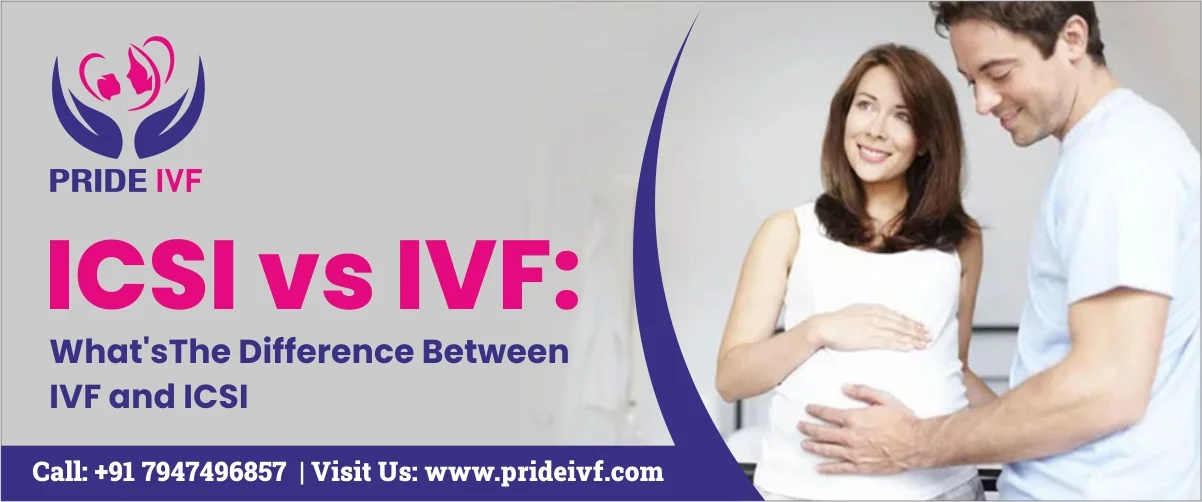The journey to parenthood often involves navigating a myriad of infertility treatment in Delhi, and two common players in this arena are In Vitro Fertilization (IVF) and Intracytoplasmic Sperm Injection (ICSI). Let’s delve into ICSI vs IVF, and the nuances of these procedures, exploring the differences, success rates, and considerations that can influence the path to conception.




Understanding the Basics
The difference between IVF and ICSI is like choosing between a traditional team effort and a superhero movie. In the realm of assisted reproductive technology, IVF stands as a widely recognized beacon of hope. It involves the fertilization of eggs and sperm outside the body, typically in a laboratory dish. On the other side of the coin is the ICSI procedure, an acronym for Intracytoplasmic Sperm Injection, which takes the fertilization process a step further. In ICSI, a single sperm is directly injected into an egg, aiming to overcome specific male infertility challenges.
The IVF Process
Envision the traditional IVF process step by step as a meticulously planned orchestration of biological events. It commences with ovarian stimulation, where medications are administered to encourage the ovaries to produce multiple eggs. Following this, the eggs are delicately retrieved and introduced to sperm in a controlled laboratory environment for potential fertilization. This method relies on the natural ability of sperm to penetrate and fertilize an egg, initiating the fundamental processes of life.
When is IVF Recommended?
The decision to pursue IVF is typically influenced by various factors. Couples dealing with unexplained infertility, ovulatory disorders, or issues with the fallopian tubes may find IVF recommended as a viable solution. Additionally, individuals or couples with a history of genetic disorders might be advised to undergo IVF coupled with preimplantation genetic testing to enhance the likelihood of a healthy pregnancy. Consult Pride IVF for the Best IVF treatment in delhi.
Intracytoplasmic Sperm Injection (ICSI) Process
Now, let’s shift our focus to ICSI—a groundbreaking technique in the realm of fertility treatments. If IVF is analogous to dance, the ICSI procedure step by step emerges as a precisely executed solo performance, offering a targeted approach to fertilization. In this specialized procedure, a microscopic needle delicately injects a single sperm directly into an egg, addressing potential obstacles that may hinder the natural fertilization process.
When is ICSI Recommended?
The prominence of ICSI becomes evident when concerns related to sperm quality take center stage. Factors such as low sperm count, poor motility, or other male infertility issues may pose challenges in the traditional IVF process. In such cases, ICSI is recommended as a strategic solution, providing a direct pathway for sperm to successfully fertilize the awaiting egg. The recommendation for ICSI is a tailored response to the specific dynamics of each individual’s fertility journey.
Preparing for ICSI vs IVF
Whether opting for In Vitro Fertilization (IVF) or Intracytoplasmic Sperm Injection (ICSI), the journey begins with thorough pre-treatment preparations.
Consultation and Assessment
The initial step in preparing for IVF or ICSI is a thorough consultation with fertility specialists. During this phase, both partners undergo a series of assessments to identify any underlying issues that may impact fertility. This includes hormonal evaluations, semen analysis (Also Read: Semen analysis test cost) for the male partner, and an assessment of ovarian reserve for the female partner.
Lifestyle Changes
Making positive lifestyle changes is integral to optimizing fertility. Both partners are encouraged to adopt a healthy lifestyle by incorporating a balanced diet, regular exercise, and stress management techniques.
Medications and Hormonal Stimulation
For IVF, the female partner typically undergoes hormonal stimulation to encourage the ovaries to produce multiple eggs. This involves the administration of fertility medications, and adherence to the prescribed schedule is vital. In the case of ICSI, hormonal stimulation may still be part of the process, but the focus shifts to the male partner’s sperm quality.
Emotional Preparedness
Embarking on the IVF or ICSI journey is not only a physical process but an emotional one as well. Couples should be prepared for the emotional ups and downs that may accompany fertility treatments.
Risks and Complications
In IVF, there’s an elevated risk of multiple pregnancies, which can lead to complications for both mother and baby. Ovarian Hyperstimulation Syndrome (OHSS) may occur during ovarian stimulation, causing swollen and painful ovaries. Ectopic pregnancies are also more likely, posing potential dangers.
On the other hand, ICSI treatment in delhi involves a fine needle injecting sperm directly into an egg, carrying a small risk of damage. Studies suggest a slightly higher risk of genetic abnormalities in ICSI-conceived embryos. Limited assessment of sperm quality and the higher financial cost are additional considerations. Thorough discussions with specialists and careful monitoring can help manage these risks in both procedures.
Lets get started
Success Rates and Considerations
As individuals embark on the journey of IVF or ICSI, the inevitable question arises: What are the success rates? Success, in the context of fertility treatments, is a nuanced concept. IVF success rates in India, and globally, vary based on multiple factors, including IVF success rates in India by age, health, and specific fertility challenges. ICSI, with its focused approach, often boasts higher ICSI success rates in cases of male infertility.
Cost Difference Between ICSI vs IVF
Beyond success rates, the financial aspect plays a crucial role in decision-making. ICSI, being a more intricate procedure, does come with a higher price tag compared to traditional IVF Cost in Delhi. However, the investment is often deemed worthwhile when considering the increased likelihood of success, especially in cases where male infertility is a primary concern.
For those navigating the landscape of ICSI treatment or considering IVF, understanding the cost implications is a practical step. It’s advisable to have candid discussions with fertility specialists to gain clarity on the ICSI cost in Delhi and weigh the financial aspects against the potential outcomes.
Patient Experiences
In the mosaic of fertility stories, real-life experiences offer a glimpse into the emotional and physical dimensions of ICSI vs IVF treatments. Couples share their challenges, triumphs, and the emotional rollercoaster that accompanies the pursuit of parenthood. These stories serve as beacons of hope, emphasizing that every path is unique, with its own set of hurdles and joys.
Conclusion
As individuals stand at the crossroads of the IVF and ICSI process, the decision-making process becomes pivotal. Consulting with experienced fertility specialists is the compass that points towards informed choices. Professionals guide prospective parents through the intricacies of IVF and ICSI, taking into account individual circumstances and fertility challenges.
For those considering IVF or ICSI treatment, the International Pride IVF Centre in Delhi stands as a beacon of expertise and compassion. Whether seeking ICSI treatment or exploring IVF options, the experienced team at Pride IVF Centre provides personalized care tailored to unique needs. Take the first step towards parenthood with confidence, armed with the support and guidance of the International Pride IVF Centre.




